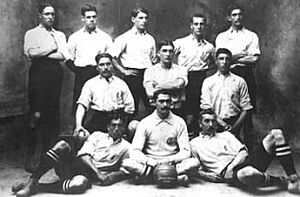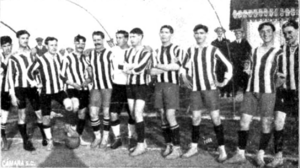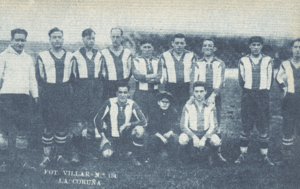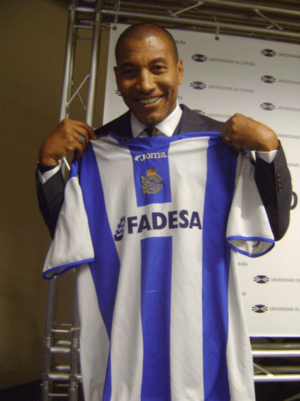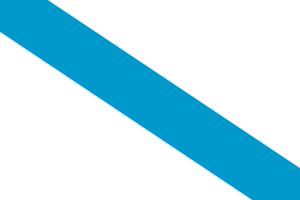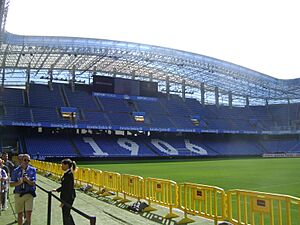Deportivo de La Coruña facts for kids
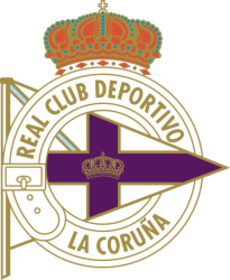 |
||||
| Full name | Real Club Deportivo de La Coruña, S.A.D. | |||
|---|---|---|---|---|
| Nickname(s) | Os brancoazuis (The Blue and Whites) Herculinos (The Herculeans) Turcos (The Turks) |
|||
| Short name | Deportivo Dépor |
|||
| Founded | 8 December 1906 as Club Deportivo de la Sala Calvet |
|||
| Stadium | Riazor | |||
| Stadium capacity |
32,490 | |||
| Owner | Abanca Corporación Bancaria, S.A. (80%) | |||
| President | Juan Carlos Escotet | |||
| Head coach | Antonio Hidalgo | |||
| League | Primera Federación – Group 1 | |||
| 2022–23 | Primera Federación – Group 1, 4th of 20 | |||
|
||||
Real Club Deportivo de La Coruña, often called Deportivo La Coruña or just Depor, is a professional football club from A Coruña, a city in Galicia, Spain. The team plays in the Segunda División, which is the second-highest football league in Spain.
Deportivo was started in 1906 as Club Deportivo de la Sala Calvet. The club has won the top Spanish league, La Liga, once in the 1999–2000 season. They have also won the Spanish Cup twice and the Spanish Super Cup three times.
For about 20 years, from 1992 to 2010, Deportivo was one of the top teams in La Liga. They often played in big European competitions like the UEFA Champions League. In the 2003–04 season, they even reached the semi-finals of the Champions League!
Deportivo plays its home games at Riazor, a stadium that can hold 32,490 fans. Their home uniform is blue and white striped shirts with blue shorts and socks. They have a big rivalry with Celta Vigo, and their matches are called the Galician derby.
Contents
Club History
How Deportivo Started
Football came to A Coruña not from England, but through a young man named José María Ábalo. He had studied in England and brought the game back home. Soon, many informal teams were playing.
In December 1906, people from the Sala Calvet gym formed Deportivo de La Coruña. Luis Cornide became their first president. In 1907, the King of Spain, Alfonso XIII of Spain, allowed the club to use "Real" (Royal) in its name. Deportivo first played at a place called Corral de la Gaiteira, but soon moved to a new field near Riazor beach.
The team played many friendly games and local leagues. In 1912, Deportivo won its first official title, the Concurso España. Football became even more popular in Spain after the national team played in the 1920 Summer Olympics. This led to many teams becoming professional, and the first Spanish league started in the 1928–29 season.
Moving Up to the Top League (1928–1947)
In 1928, Deportivo didn't make it into the very first Primera División. Instead, they played in the Segunda División (Second Division). In 1932, they famously beat Real Madrid in the Cup, even though Real Madrid had been unbeaten in the league that season!
The Spanish Civil War stopped all football until the 1939–40 season. Deportivo almost got promoted that year but lost to their rivals, Celta de Vigo. However, the very next season, they won their play-off game and were promoted to La Liga for the first time!
In their first season in the top league, they finished fourth. But over the next few years, they went up and down between the first and second divisions. This was a time of change for the club.
During this period, Deportivo built their new stadium, Riazor, which opened in 1944. A key player then was goalkeeper Juan Acuña. He won the Ricardo Zamora Trophy (for best goalkeeper) four times, making him one of the best in Spanish football history.
The "Golden Decade" (1948–1957)
Deportivo had a great period from 1948 to 1957. In the 1949–50 season, they finished as runners-up in La Liga, just one point behind the champions. This was a big achievement! The team had many talented South American players and stayed in the top league for nine years in a row. Famous players like Pahiño and Luis Suárez played for Deportivo during this "Golden Decade."
The "Elevator Team" (1958–1973)
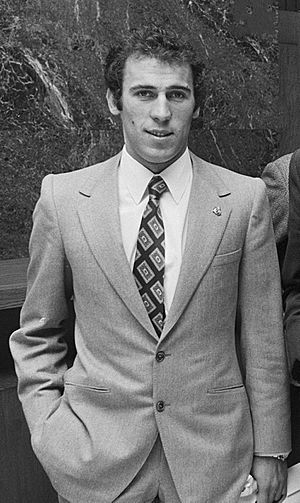
After their "Golden Decade," Deportivo became known as the "elevator team." This meant they kept getting promoted to the top league and then relegated back down. They were promoted in 1962, 1964, 1966, 1968, and 1971, but then relegated in 1963, 1965, 1967, 1970, and 1973.
Even though they struggled to stay in the top league, Deportivo had one of the best youth training systems in Spain. Young stars like Amancio Amaro and Luis Suárez started their careers here. However, the club often had to sell its best players because of money problems, which made it hard to stay in the top division. This "elevator era" ended when they were relegated in 1973.
Tough Times (1974–1988)
After 1973, Deportivo faced difficult years. They even dropped to the third division (Tercera División) for the first time. They quickly got promoted back to the second division, but it was a challenging period. The club had many financial problems and changed managers almost every year.
In the 1987–88 season, Deportivo almost got relegated again. But in the very last game, a player named Vicente Celeiro scored a goal in extra time, saving the team! This moment is often seen as the end of the club's dark times and the start of something new.
The "Súper Dépor" Era (1989–1998)
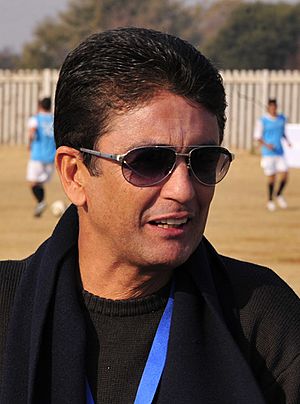
In 1988, Arsenio Iglesias, a former player and coach, became manager again. Deportivo's luck began to change. In the 1990–91 season, they finally got promoted back to La Liga after 18 years! The club's money situation also got better, and more fans started supporting the team.
The team, now known as "Súper Dépor," became very strong. They added experienced players and exciting young talents like the local player Fran and Brazilian stars Bebeto and Mauro Silva.
In the 1992–93 season, Deportivo finished third in La Liga, which meant they qualified for European competitions for the first time! Bebeto was the league's top scorer, and Paco Liaño was the best goalkeeper.
The 1993–94 season was almost perfect. Deportivo led La Liga for most of the year. On the last day, they needed to win to become champions. But a penalty kick was missed, and they lost the title by a tiny margin. Still, it was an amazing season.
In the 1994–95 season, Deportivo finished second in La Liga again. But the biggest surprise came in the Spanish Cup. They reached the final against Valencia. The game was stopped due to heavy rain and finished three days later. Deportivo won 2–1, thanks to a goal from Alfredo Santaelena. This was their first major trophy!
La Liga Title and European Glory (1999–2006)
In the 1999–2000 season, under manager Javier Irureta and with stars like Roy Makaay and Diego Tristán, Deportivo finally won their first-ever La Liga title! They finished five points ahead of Barcelona and Valencia. A Coruña became one of the smallest cities in Spain to have a La Liga champion.
Winning the league meant Deportivo played in the UEFA Champions League for the first time. They did very well, even beating Manchester United twice in one season! Their best Champions League run was in the 2003–04 season, where they reached the semi-finals. This campaign is also famous for their incredible comeback against AC Milan. Milan won the first game 4–1, but Deportivo won the second game 4–0 at home, knocking out the defending champions!
In the 2001–02 season, Deportivo finished second in La Liga and won the Spanish Cup again. This final was special because it was against Real Madrid, who were celebrating their 100th anniversary. The game was played at Real Madrid's home stadium, the Santiago Bernabéu. Everyone expected Real Madrid to win easily, but Deportivo won 2–1. This upset is famously known as the Centenariazo (meaning "the 100th anniversary upset").
Changes and Challenges (2007–Present)
After their golden era, Deportivo went through a period of change. They were relegated from La Liga in 2011. However, they quickly returned to the top league, winning the Segunda División title in 2012 with a record number of points.
They were relegated again in 2013 but bounced back to La Liga in 2014. The club continued to face challenges, including another relegation in 2018.
In 2020, Deportivo was relegated to the third division (Segunda División B), which was the first time in 39 years. The Spanish league system was reorganized, and they played in the new Primera División RFEF.
After four seasons in the third tier, Deportivo finally won promotion back to the second division in the 2023–24 season. The deciding match against Barcelona Atlètic had a record attendance of 31,833 fans, showing the strong support for the club.
Club Identity
Team Crest
Deportivo's club crest has parts from the old Sala Calvet gym crest. It features a blue diagonal stripe, which comes from the maritime flag of A Coruña and the Galician flag. The crown on the crest shows that the club has "royal" support, which was given by King Alfonso XIII in 1909. During a time when Spain was a republic, the "royal" part and the crown were removed, but they were brought back later.
Team Kit
Deportivo has always worn its famous blue and white striped shirts. These colors became official for matches in 1912. Today, they still wear blue and white striped shirts with blue shorts and socks. Their second and third kits change each year. Their main shirt sponsor is the local brewery Hijos de Rivera, and Kappa makes their kits.
| Years | Kit manufacturer | Sponsor | |
|---|---|---|---|
| Brand | Company | ||
| 1990–92 | Rox | Leyma | Leite Rio, S.L. |
| 1992–97 | Umbro | Feiraco | Feiraco Sociedad Cooperativa Galega |
| 1997–00 | Adidas | ||
| 2000–01 | Dreamcast | Sega Europe Ltd | |
| 2001–07 | Joma | Fadesa | Fadesa Inmobiliaria, S.A. |
| 2007–08 | Canterbury of New Zealand | ||
| 2008–09 | Estrella Galicia | Hijos de Rivera, S.A.U. | |
| 2009–17 | Lotto | Estrella Galicia 0,0 | |
| 2017–21 | Macron | ||
| 2021– | Kappa | ||
Club Supporters
Deportivo fans are called deportivistas. In 2007, a survey showed that Deportivo was the ninth most popular team in Spain. Fans organize themselves into about 200 fan groups called peñas. The most famous one is the "Riazor Blues."
Even when the club was in the third division in the 2022–23 season, they had 25,001 season ticket holders! A match against Real Madrid Castilla in March 2023 had 26,745 fans, which was one of the highest attendances in Spain that weekend. Later, a play-off match broke that record with 28,828 fans.
Club Stadium
- Name – Abanca-Riazor
- City – A Coruña
- Capacity – 32,490 people
- Opened – 1944
- Pitch size – 105 x 68 meters
Current Squad
First-team squad
|
|
Reserve team
|
|
Other players under contract
|
Out on loan
|
Technical Staff
Last updated: 26 January 2025
Source: RC Deportivo
Club Honours
Deportivo La Coruña has won several important titles:
League Titles
- La Liga
- Winners (1): 1999–2000
- Segunda División (Second Division)
- Winners (5): 1961–62, 1963–64, 1965–66, 1967–68, 2011–12
- Tercera División (Third Division)
- Winners (1): 1974–75
- Primera Federación (Third Tier)
- Winners (1): 2023–24
Cup Titles
- Copa del Rey (Spanish Cup)
- Winners (2): 1994–95, 2001–02
- Supercopa de España (Spanish Super Cup)
- Winners (3): 1995, 2000, 2002
- Concurso España
- Winners (1): 1912
Individual Player Awards
- Pichichi (Top Scorer in La Liga)
- 1992–93 – Bebeto (29 goals)
- 2001–02 – Diego Tristán (21 goals)
- 2002–03 – Roy Makaay (29 goals) (He also won the European Golden Shoe that year!)
- Zamora (Best Goalkeeper in La Liga)
- 1941–42, 1942–43, 1949–50, 1950–51 – Juan Acuña
- 1992–93, 1993–94 – Francisco Liaño
- 1996–97 – Jacques Songo'o
European Football Record
Deportivo has played in several European competitions. Here's a quick look at their overall record:
| Competition | Played | Won | Drew | Lost | GF | GA | GD | Win% |
|---|---|---|---|---|---|---|---|---|
| UEFA Champions League | 62 | 25 | 17 | 20 | 78 | 79 | −1 | 40.32 |
| UEFA Cup Winners' Cup | 8 | 4 | 2 | 2 | 14 | 3 | +11 | 50.00 |
| UEFA Cup / UEFA Europa League | 32 | 14 | 5 | 13 | 43 | 36 | +7 | 43.75 |
| UEFA Intertoto Cup | 10 | 8 | 0 | 2 | 18 | 10 | +8 | 80.00 |
| Total | 112 | 51 | 24 | 37 | 153 | 128 | +25 | 45.54 |
Source: UEFA.com
Pld = Matches played; W = Matches won; D = Matches drawn; L = Matches lost; GF = Goals for; GA = Goals against; GD = Goal Difference.
Player Records
Most Games Played
These players have played the most matches for Deportivo:
| No. | Name | Matches |
|---|---|---|
| 1 | 700 | |
| 2 | 482 | |
| 3 | 459 | |
| 4 | 422 | |
| 5 | 393 | |
| 6 | 383 | |
| 7 | 363 | |
| 8 | 336 | |
| 9 | 331 | |
| 10 | 327 |
Most Goals Scored
These players have scored the most goals for Deportivo:
| No. | Name | Goals |
|---|---|---|
| 1 | 110 | |
| 2 | 107 | |
| 3 | 106 | |
| 4 | 102 | |
| 5 | 97 | |
| 6 | 90 | |
| 7 | 82 | |
| 8 | 80 | |
| 9 | 75 | |
| 10 | 69 |
Women's Team
Real Club Deportivo de La Coruña Femenino is the women's football team of Deportivo. They play in the Primera Federación, which is the second-highest league for women's football in Spain.
Women's Team Honours
- Women's Spanish Cup (unofficial) (2): 1981, 1982
- Women's Spanish Cup (3): 1983, 1984, 1985
Reserve Team
Real Club Deportivo Fabril is the reserve team for Deportivo de La Coruña. It was founded in 1914 as Fabril Sociedad Deportiva. The team currently plays in Segunda Federación, the fourth tier of Spanish football. Their home stadium is called Cidade Deportiva de Abegondo.
In 1993, the team's name was officially changed to Deportivo B, but many local fans still called it "Fabril." In 2017, the name was changed back to Real Club Deportivo Fabril.
See also
 In Spanish: Real Club Deportivo de La Coruña para niños
In Spanish: Real Club Deportivo de La Coruña para niños
 | Sharif Bey |
 | Hale Woodruff |
 | Richmond Barthé |
 | Purvis Young |


